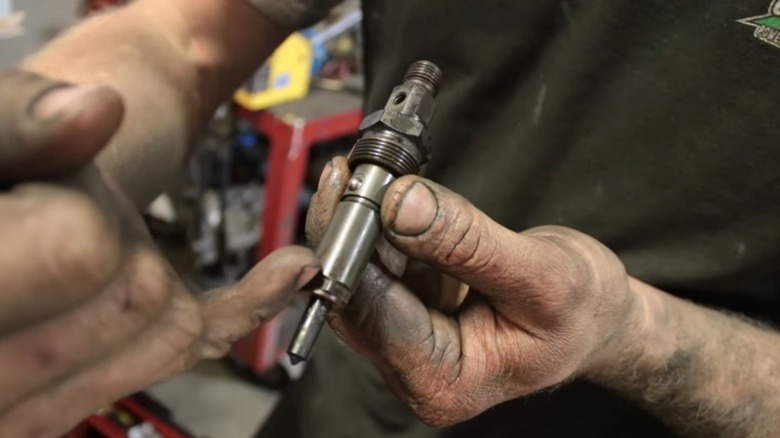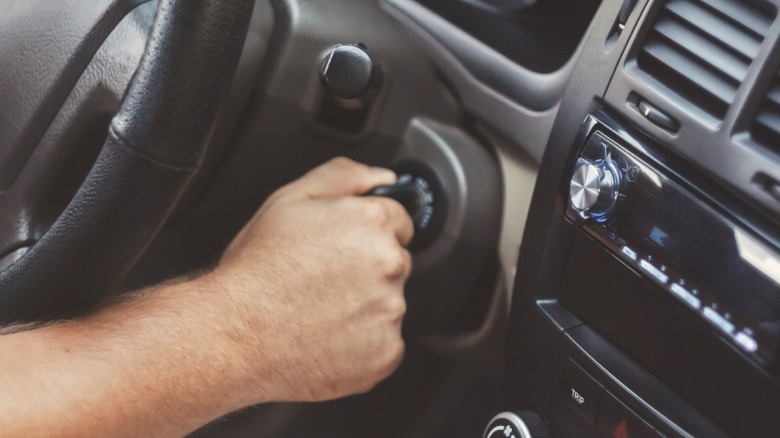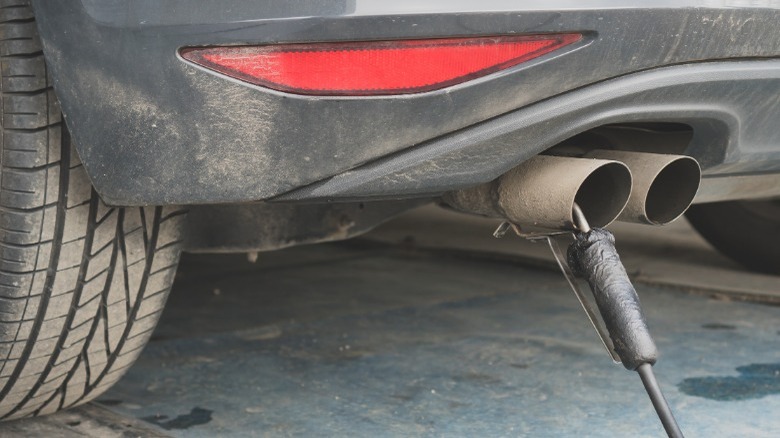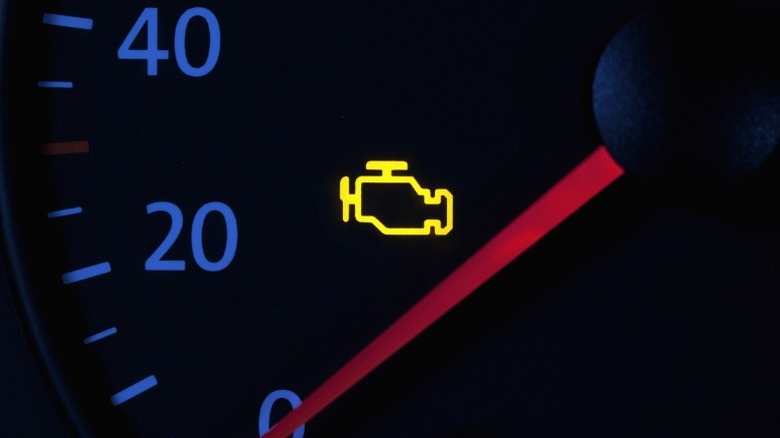6 Common Symptoms Of Diesel Fuel Injector Failure
Most people know that internal combustion engines require a fuel source to run. For many passenger cars and trucks, that fuel source is gasoline. However, many commercial vehicles, boats, farming implements, military vehicles, and even lots of regular passenger cars rely on diesel. Diesel engines are responsible for powering more than you may realize, and the fuel can be a surprisingly efficient power source. Besides fuel, there are various other differences between modern diesel and gas engines. However, they also share a lot of similarities, including the use of fuel injectors.
Diesel fuel injectors are responsible for spraying precise amounts of diesel into combustion chambers or swirl chambers, depending on whether the engine uses direct or indirect fuel injection. Then, that fuel is compressed and heated by glow plugs until it burns, creating the small explosions that give the engine its power. Fuel injectors play an important role, and they can cause a lot of issues for your engine when they fail.
Fortunately, there are some common signs of diesel fuel injector failure that can help you catch the problem before more damage develops. Knowing the signs isn't a substitute for performing regular maintenance, which is the best way to avoid fuel injector issues, but it can help you address the problem before it worsens. As a former professional mechanic and a lifelong car fanatic, I'll cover the most common symptoms of diesel fuel injector failure. That way, you can hopefully avoid the seriously expensive issues that may develop if you ignore your faulty injectors. So, from misfires to a rough idle, here are the most common symptoms of diesel fuel injector failure.
Your vehicle is difficult to start
We've mentioned that the fuel injectors are responsible for metering precise amounts of diesel into the combustion chambers or swirl chambers. However, if one or more injector is faulty or beginning to fail, your engine may not get the right amount of fuel. That can cause a lot of issues, including difficulty starting your car or the inability to start the vehicle altogether.
The issue can occur when fuel injectors become clogged by impurities in the diesel fuel. Alternatively, your injectors may fail if they break, develop a leak, experience an electrical malfunction, or simply wear out with time. If your injectors are bad, you may experience difficulty starting your engine in that it takes a long time to crank, or you have to pump the gas pedal to make it fire up. If the problem is already severe enough, you may be unable to start your vehicle at all. That's because if the injectors have failed completely, no fuel will be able to reach your engine.
The tricky thing is that there are various mechanical issues that can prevent your engine from starting. There are a few ways to test diesel fuel injectors. However, if you're not an experienced DIYer or home mechanic, you may struggle to perform them. Instead, if you're having trouble starting your diesel engine, and you suspect an injector issue, the best thing to do is visit a pro. They may be able to clean your fuel injectors, but they'll most likely replace them with a fresh set to fix your problem.
There's a strong diesel odor
Another common symptom of diesel fuel injector failure is a strong fuel odor coming from your vehicle, especially if the smell is strongest around the upper area of your engine bay. If you can smell fuel near the back or middle of your vehicle, the issue is more likely to be related to the fuel lines, tank, or another component.
Diesel fuel injectors can fail and develop leaks over time or due to damage. The leak is what causes that strong fuel smell. Even just a tiny drop of fuel can create a very powerful odor, and if your injectors are leaking but still functional enough for your engine to run, that smell can become extremely overpowering. Again, various fuel system malfunctions can cause your vehicle to develop a fuel odor. You can narrow down the potential culprits by trying to locate the source of the smell. However, at the end of the day, if you're not a mechanic or knowledgeable DIYer, you'll probably need a professional's help when it comes to diagnosing and repairing the problem.
Your car fails an emissions test
These days, many U.S. states require some form of yearly emissions or SMOG testing before you can renew your vehicle registration. These laws are designed to help prevent excess air pollution, but they can be a source of stress for owners of vehicles that aren't exactly in tip-top condition. Various issues can cause your car to fail a SMOG test, making the problem difficult to diagnose. However, one common culprit when it comes to failing emissions tests are faulty diesel fuel injectors.
The issue occurs when the injectors become dirty or contaminated by impurities in the fuel or outside particles like dirt and dust. Those things can disrupt the injectors' performance and introduce various contaminants to the engine, causing it to burn dirty.
If you live in a state that requires emissions testing and your vehicle fails, your mechanic will most likely begin an inspection that covers everything from the fuel injectors to your exhaust pipe and more. However, if you don't live somewhere that requires SMOG testing, it may be harder to know there's a problem. Other common symptoms of dirty injectors that could lead to a failed emissions test in a different state include things like excessive smoke from the exhaust or an extremely sooty-looking tailpipe.
You experience engine misfires or knocks
Another very common symptom of diesel fuel injector failure is an engine misfire. It occurs when one or more of your engine's cylinders fail to complete the entire combustion process properly. Misfires usually feel like a sudden shudder or loss of power, and they're usually accompanied by an inconsistent or irregular idle. You may struggle to build speed, or it may feel like your gas pedal is unresponsive. Alternatively, you may hear pinging or knocking sounds coming from the engine bay.
That's because the fuel injectors are responsible for sending diesel to the engine. If they're faulty or malfunctioning, one or more cylinders may get the right amount of fuel, leading to combustion issues and, potentially, misfires. Unfortunately, a lot of different problems can cause engine misfires, which can make the diagnosis process difficult. You can help yourself narrow down the source of the problem by paying attention to your vehicle and its performance.
If you notice the misfire in conjunction with one of the other issues covered above, there's a good chance the problem is related to your fuel injectors. That said, you should prioritize visiting a professional mechanic for an inspection any time you notice misfires or any other abnormal vehicle behavior. Doing so early can help you address the issue before it becomes more severe and more expensive.
Your check engine light turns on
Modern vehicles are built with various complex sensors and computers designed to monitor vehicle functions, control certain systems, and alert you if there's an issue. Your car's onboard diagnostic (OBD) system is responsible for overseeing various parts of your vehicle and triggering a dashboard warning light if it detects abnormal behavior. Of those warning lights, the check engine light is one of the most common, and it's something you may notice on your dash if you experience diesel fuel injector failure.
The check engine light may appear if your fuel injectors are bad because the fuel system is one of the various parts of your vehicle monitored by its OBD system. Modern fuel injectors are tied into your car's electrical system. If an injector fails, begins to spray the incorrect amount of fuel, or starts behaving strangely, the system will pick up on it, and, usually, it will trigger the check engine light.
However, your check engine light can turn on for many, many different reasons. If you don't have access to an OBDII scan tool, you won't be able to identify the cause of the light's appearance. There are some ways to check your engine codes without a scan tool. However, not all of those methods will work for every vehicle, and your best move is to visit a professional mechanic for an inspection and an accurate diagnosis.
Your vehicle's overall performance begins to suffer
We've covered several symptoms of diesel fuel injector failure so far, and each of them can affect your car's performance in various ways. However, we haven't mentioned general performance drops yet. This issue is somewhat tricky to identify and diagnose because it can take so many forms and be the result of so many different malfunctions. Generally, performance problems take the form of things like difficulty accelerating, a rough idle, a drop in gas mileage, or an overall feeling that the engine just isn't as powerful as it should be.
The issue is likely to happen if you experience diesel fuel injector failure because the engine won't receive the proper amounts of fuel for combustion. It's an especially common symptom when your injectors are starting to fail — like when slightly clogged or broken — but haven't died completely yet, as the engine may get small amounts of fuel but not enough to run smoothly. The problem is that, like many of the other symptoms covered on this list, performance drops can be the result of various different mechanical malfunctions. So, if your diesel vehicle starts running poorly or something just doesn't feel right, you should visit a professional repair technician as soon as possible.






